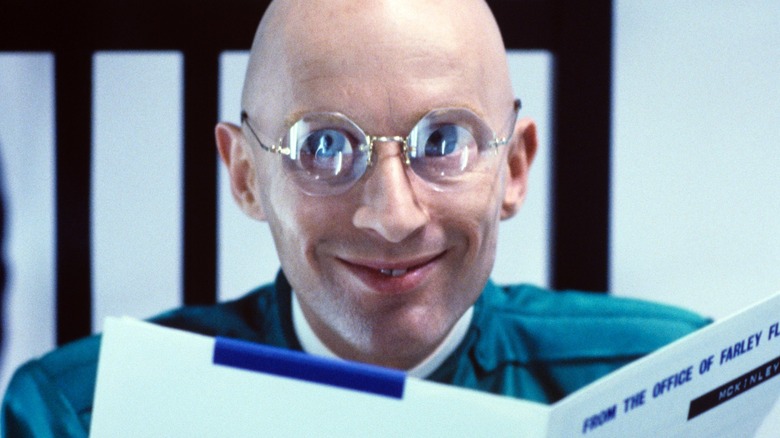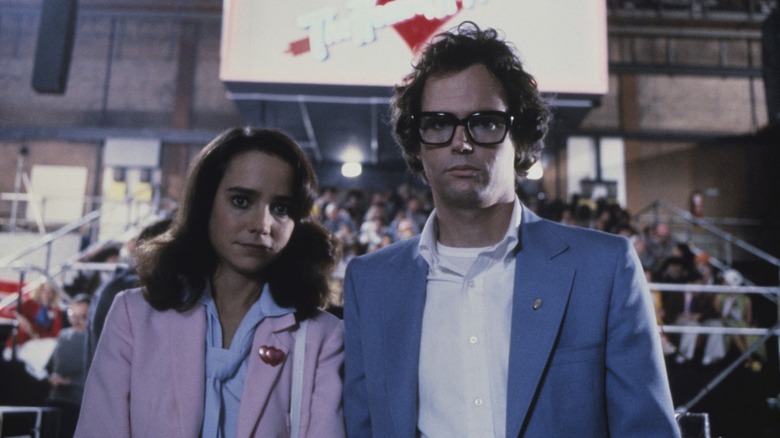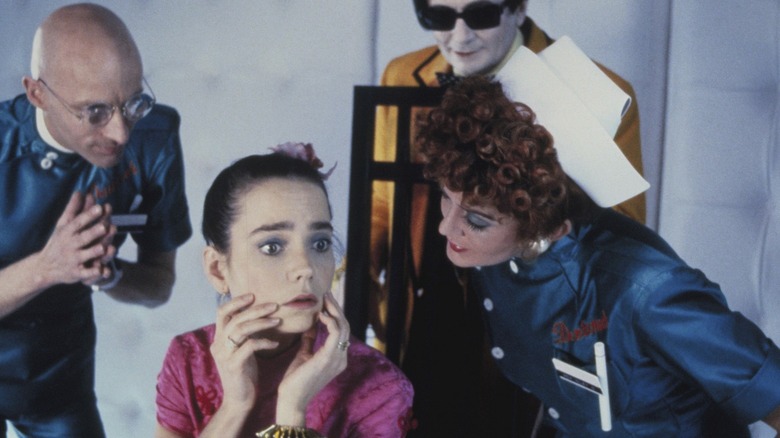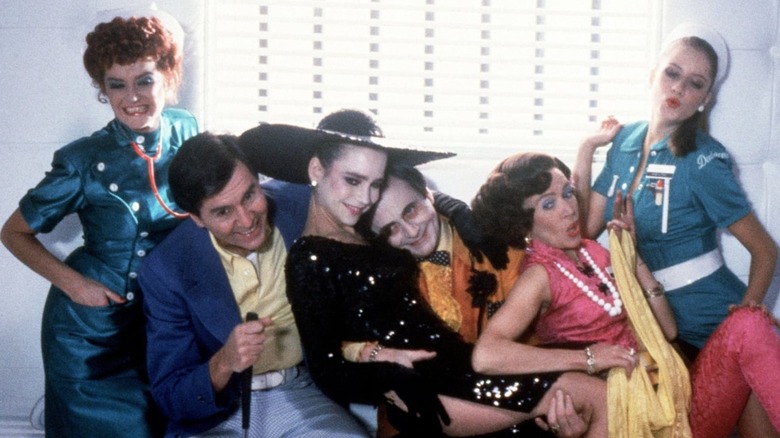
If you're a living human being then chances are you're familiar with "The Rocky Horror Picture Show." It's the embodiment of the cult musical, the midnight movie favorite that has become a rite of passage for generations of fans of kitschy sci-fi and queer kids the world over.
Initially a flop upon release, the 1975 movie adaptation of "The Rocky Horror Picture Show" soon found its fans and evolved into a near-legendary cinematic experience. The audience catcalls and throwing of toilet paper are almost as iconic as the film itself. Even after Disney acquired the movie through its acquisition of 20th Century Fox and began withdrawing archival Fox movies from theaters, the studio allowed "Rocky Horror" to remain a midnight screening staple.
Once you've actually seen "Rocky Horror," it's hard to imagine anyone getting to the end of the film and saying, "Wow, I can't wait for the sequel." Musical sequels rarely happen and almost never work. Yet "Rocky Horror" creator Richard O'Brien had a bunch of ideas for a follow-up, and so, in 1981, audiences got the official sequel to "The Rocky Horror Picture Show." Sort of. But not really.
Brad And Janet Redux

"Shock Treatment" isn't technically a sequel to "Rocky Horror." Some of the characters from the first film are here, but not in ways you would recognize, and there are no sweet transvestites or B-movie parodies. There's no Tim Curry or Susan Sarandon. O'Brien is here, but not as Riff Raff. There isn't a corset in sight. Rather, the film -- directed by Jim Sharman, who also made "Rocky Horror" -- is a kind of alternate reality version of its more famous predecessor. The wide-eyed picture-perfect couple Brad and Janet are here, but they clearly never made their way to the Frankenstein place. As the tagline put it, "It's not a sequel ... it's not a prequel ... it's an equal!"
This time around, Brad and Janet (now played by Jessica Harper and Cliff DeYoung) are living in Denton and having some marriage troubles. The picturesque '50s town has been taken over by a mysterious fast-food magnate named Farley Flavors, and now everything is encased within the Denton Television (DTV) network studio. Essentially, it's a 24/7 reality TV series long before that genre was even a thing. Brad ends up confined to a quack medical facility run by two very familiar faces, while Janet becomes an egotistical diva star of the network.
Where "Rocky Horror" looked to the past for its inspiration (most notably sci-fi films and the burgeoning queer movement of the early '70s), "Shock Treatment" gazes towards the near and deceptively sinister future. The concept of reality television as we know it was just around the corner at the time, although it would take a few decades for it to evolve into the utterly inescapable entertainment force we know and fear today. O'Brien may not have fully known it at the time, but he was tapping into a burgeoning cultural shift that would irrevocably change how we understand television and celebrity.
The Acceptable Face Of The Human Race

Denton's residents proudly swarm into DTV to become the audience and participants of a seemingly never-ending cycle of shows that sell a heightened fantasy of good clean American life. As the opening musical number "Denton U.S.A." puts it, they're "the acceptable face of the human race." They cheer on commercials and coo over product placement and even sleep in the studio at night to be up bright and early for the next day of excitement.
The sheer surrealness of this set-up is utterly normal to Denton's locals, which explains how neither Brad nor Janet seem particularly shocked when a game show leads to Brad being institutionalized. Soon, his perilous situation (and endless drugging by the "doctors" who turn out to be European character actors looking for a new gig) becomes just another form of entertainment in Denton. If "Rocky Horror" was a subversion of the rigid gender norms of a bygone era, "Shock Treatment" embodies the growing conservatism of the uber-corporate Reagan era.
Indeed, mental health is the newest gimmick being packaged and sold to the masses via Dentonvale. Farley Flavors, also played by Cliff DeYoung, wants to "put sanity back on the national menu" via his blatantly evil plans to enslave the world using shock treatment. Obviously, the real nuances and difficulties of mental health struggles aren't Farley's priority. What matters is making it look cool to be committed, and he does that so well (with one especially catchy song where he brags about how he's "gonna take over the entire human race!") that Denton's locals flock to his scheme. All who are critical of him are cancelled or booed off stage.
The notion of being sold a crock of sh*t and giddily swallowing it because a charismatic TV pitchman with fascistic leanings tells you to do so isn't a subtle dig, but it remains dishearteningly pertinent. The Trump administration had a lot of people considering the prescience of "Network," but "Shock Treatment" is far more fitting a comparison.
Why Shock Treatment Wasn't As Big As Rocky Horror

Don't let this thematic discourse trick you into thinking "Shock Treatment" is po-faced. It's really a blast. The tunes may not be the legendary earworms you heard in "Rocky Horror," but they show O'Brien at his most lyrically witty. Brad and Janet lament their waning marriage in a song titled "Bitchin' in the Kitchen", where they find inspiration in the ad breaks ("Dear blender, oh won't you help a first offender, oh toaster, don't you put the burn on me.") After Janet's bigoted father finds out that a friend of his was caught up in a gay sex scandal, he sings a number about what defines a "real" man. One line says that "men should know the right occasions to indulge in tax evasions."
It's the kind of scathing satire of pompous American masculinity that wouldn't seem out of place in a John Waters comedy. If there's a weakness in this musical, it's in how many of the songs don't seem connected to the story, even if they are solid numbers. Janet sings a slinky number called "Looking for Trade" that comes out of nowhere and is shot like a De Palma movie. No complaints, of course, but it's not exactly crucial to the narrative.
Rather than let the movie stand on its own two feet, Fox tried to reverse-engineer another midnight cult hit. "Shock Treatment" was treated like an exclusive "only for the real fans" event from the get-go, and it was only released as a midnight screening special on Halloween 1981. It never received a full general theatrical first-run release. Fox executives didn't seem to understand the problem with this method or how cult movies actually happen. As a result, "Shock Treatment" ended up being a bigger financial flop than "Rocky Horror." Fans of the original movie didn't warm to it either -- not when all the things they loved about "Rocky Horror" seemed wholly absent from its "equal." Even O'Brien would later refer to "Shock Treatment" as "an abortion." Its journey towards anything remotely resembling cult status took a bit longer than its older sibling.
But people did eventually return to "Shock Treatment." "Rocky Horror" is now probably too mainstream to truly be cult-friendly, but "Shock Treatment" has retained its rough-around-the-edges underground feel. It's a retro tale with a timely theme, a hidden gem with many layers still to be revealed. It all depends on whether or not audiences are ready for a story about charismatic con artists and the ways we eagerly buy the dangers they're selling. But with songs!
Read this next: The 15 Best '70s Horror Movies Ranked
The post 40 Years of Shock Treatment, the Underrated Rocky Horror Sequel appeared first on /Film.
from /Film https://ift.tt/3jMCt5m
via IFTTT
Comments
Post a Comment